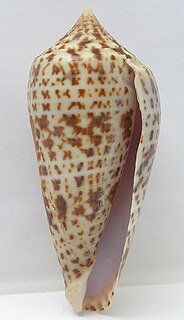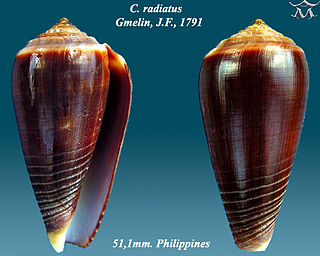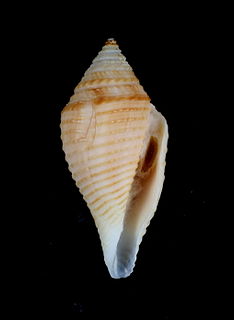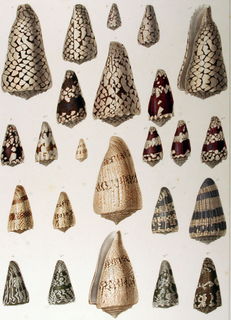A toxin is a harmful substance produced within living cells or organisms; synthetic toxicants created by artificial processes are thus excluded. The term was first used by organic chemist Ludwig Brieger (1849–1919), derived from the word toxic.

Conidae, with the current common name of "cone snails," is a taxonomic family of predatory sea snails, marine gastropod molluscs in the superfamily Conoidea.

A conotoxin is one of a group of neurotoxic peptides isolated from the venom of the marine cone snail, genus Conus.

Cone snails, cone shells, or cones are a large group of small- to large-sized extremely venomous predatory sea snails, marine gastropod molluscs.

Conus lynceus, the lynceus cone, is a species of predatory sea snail, a marine gastropod mollusk in the family Conidae, the cone snails, cone shells or cones.

Conus geographus, popularly called the geography cone or the geographer cone, is a species of predatory cone snail. It lives in reefs of the tropical Indo-Pacific, and hunts small fish. Although all cone snails hunt and kill prey using venom, the venom of this species is potent enough to kill humans. Specimens should be handled with extreme caution.
Conus gigasulcatus is a species of sea snail, a marine gastropod mollusk in the family Conidae, the cone snails and their allies.

Conus kinoshitai, common name Kinoshita's cone, is a species of sea snail, a marine gastropod mollusk in the family Conidae, the cone snails and their allies.

Conus radiatus, common name the rayed cone, is a species of sea snail, a marine gastropod mollusk in the family Conidae, the cone snails and their allies.

Conus rolani, common name Rolan's cone, is a species of sea snail, a marine gastropod mollusk in the family Conidae, the cone snails and their allies.

Conus sulcatus, common name the grooved shell, is a species of sea snail, a marine gastropod mollusk in the family Conidae, the cone snails and their allies.

Conus victoriae, common name the Queen Victoria cone, is a species of sea snail, a marine gastropod mollusk in the family Conidae, the cone snails and their allies.

Conasprella coromandelicus is a species of sea snail, a marine gastropod mollusk in the family Conidae, the cone snails and their allies.

Conasprelloides is a subgenus of sea snails, marine gastropod mollusks in the family Conidae, the cone snails and their allies.

The taxonomy of the cone snails and their allies as proposed by John K. Tucker and Manuel J. Tenorio in 2009 was a biological classification system for a large group of predatory sea snails. This system was an attempt to make taxonomic sense of the large and diverse group which contains the family Conidae, the cone snails. The authors proposed extensive changes to the family Conidae in contrast to the way the group was treated in the taxonomy of the Gastropoda by Bouchet & Rocroi, 2005. Bouchet and Rocroi included in the family Conidae several other groups of toxoglossan snails which had previously been placed in the Turridae.

Conasprella ichinoseana is a species of sea snail, a marine gastropod mollusk in the family Conidae, the cone snails and their allies.

Conus is a genus of predatory sea snails, or cone snails, marine gastropod mollusks in the family Conidae. Prior to 2009, cone snail species had all traditionally been grouped into the single genus Conus. However, Conus is now more precisely defined, and there are several other accepted genera of cone snails. For a list of the currently accepted genera, see Conidae.
CNF-Sr3, also known as conorfamide-Sr3, is a toxin derived from the venom duct of Conus spurius. CNF-Sr3 is an inhibitor of the Shaker channel, a subtype of the voltage-gated potassium channels.

Conus alexisallaryi is a species of sea snail, a marine gastropod mollusk, in the family Conidae, the cone snails and their allies.















